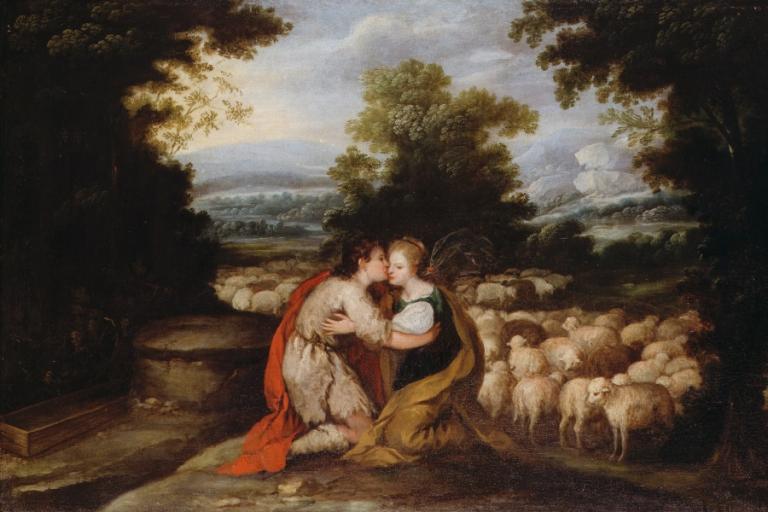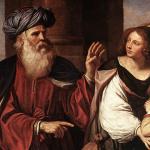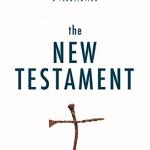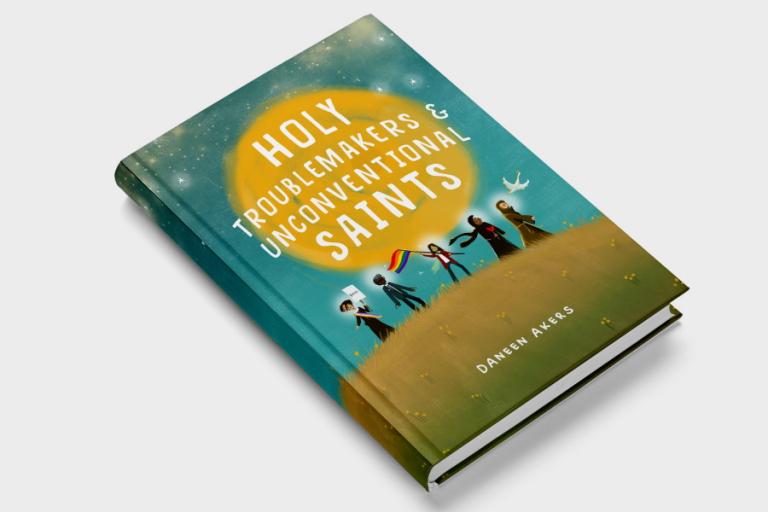I previously made the claim that patriarchy—rather than polygamy—is the primary source of problems in biblical polygamous marriages. I then began an in-depth examination of some of the Bible’s most prominent polygamous marriages, starting with that of Abram. I will now continue with that of Jacob.
Trigger warning: This scriptural account contains slavery, rape, and other abuses.
Rachel

The account of Jacob and his wives starts out with a little more promise than that of his grandfather, Abram. Rather than immediately defining the woman by her child-bearing ability, as with Sarai, the text instead describes Rachel by her occupation—“she was a shepherdess” (Genesis 29:9).1 And although the androcentric text insists on telling us that “Rachel was beautiful in both face and figure,” Jacob ultimately wants to marry her because he “had fallen in love with her” (vv. 17–18). The Greek Septuagint renders “love” in this verse with the agape root, suggesting that Jacob’s love is indeed something deeper and truer than mere infatuation.
However, while Jacob may, at this point, be driven by his love for Rachel, the same cannot be said for her father, Laban. He has no qualms about using his daughters for personal gain. And Jacob and Laban are both operating firmly within a patriarchal framework. From the start, Jacob’s courtship of Rachel amounts to a financial transaction. She is the “wage” that Laban would “give” to Jacob, if Jacob “would work seven years” for Laban (vv. 15 and 18–19). Rachel is treated as property—she is the payment for services rendered.
Leah
But Laban isn’t above taking his patriarchy a step further. He involves his daughters in a game of trickery and deceit, in order to make even more profit from them. When the time comes for Jacob to marry Rachel, Laban tricks Jacob into marrying Rachel’s older sister, Leah (vv. 20–24). When Jacob realizes what has happened, he’s furious, but it’s too late; the marriage has already been consummated (v. 25). After offering a lame excuse, Laban suggests that Jacob wait a week and then take Rachel as a second wife—on the condition that he work another seven years for her (vv. 26–27).
With no other way to marry his beloved Rachel, Jacob agrees, and he ends up with two wives (vv. 28–29). But now we have a problem. Unlike polyamory—wherein each partnership is based on love—in this particular marriage, Jacob only loves Rachel, “rather than Leah” (v. 30). He is married to Leah for no other reason than that his father in law tricked him into it, so he is now legally bound to keep her. This loveless marriage becomes a major source of problems, and it is a direct result of Laban’s patriarchal scheming.
Complicating things further, Rachel seems unable to bear children, but God grants Leah fruitfulness as compensation for being unloved by Jacob (v. 31). So once again, patriarchy ends up defining women by their child-bearing potential. This drives much of the narrative that follows. Leah goes on to bear four sons while Rachel has none (vv. 32–35).
Bilhah
Rachel, much like Sarai before her, decides that a child through her slave-girl would be better than no child at all, so she has Jacob take Bilhah as a third wife (30:1–3). As with Hagar before her, Bilhah is now treated as the property of property. She has no say in the matter herself, and at this point, she exists primarily to produce a child. Once again, I must emphasize that the power dynamics and the lack of consent mean that what Bilhah experienced was rape. This is patriarchy through and through. Bilhah goes on to bear two sons (vv. 4–8).
Zilpah
In response, Leah decides that Jacob should take her slave-girl, Zilpah, as a fourth wife, perpetuating their patriarchy and abuse even further (v. 9). Zilpah goes on to bear two sons (vv. 10–13). Leah bears another son, whom she considers to be a reward from God, “because I gave my slave-girl to my husband” (vv. 14–18). This should be obvious, but God did not reward Leah for having her husband rape her slave. Leah then bears yet another son, followed by a daughter (vv. 19–21).
At this point, Rachel is finally able to conceive, and she bears a son (vv. 22–24). Much later—after Jacob has wrestled with God, and God has changed Jacob’s name to Israel—Rachel bears a second son, but she dies in childbirth (35:16–19). Leah’s oldest son, Reuben, then has sex with Bilhah (v. 22), and this is the last recorded interaction with any of Israel’s wives.
Conclusion
Once again, we see that the problems experienced in this polygamous marriage can all be traced back to patriarchy. Were it not for Laban’s patriarchal scheming, Jacob would probably have only married Rachel—the one woman he truly loved—and that would have prevented most of the problems that followed. If polygamy is to be done right, then it must be based on love for every partner. Yet three of Jacob’s four marriages were based instead on patriarchal control and gender expectations. And that’s a recipe for disaster.
I’ll next examine the many marriages of David and Solomon.
Footnote
1 All scripture quotations that follow are taken from The Revised English Bible.
Posts on polyamory
- It’s Time for the Church to Talk About Polyamory
- Conflating Polyamory, the LGBTQ Community, and Orientation
- What Polyamory Is Not
- Christian Sexual Ethics and Polyamory
- Southern Baptist Preacher Affirms Polyamory (Interview with Rev. Dr. Jeff Hood)
- Is God Polyamorous?
- 5 Reasons for Writing about Polyamorous Families (Guest Post by Mark Kille)
- Polyamory and the Kingdom of God (by Christian Chiakulas on Radical Christian Millennial)
- What Are Polyamorous Christians to Make of Karl Barth? (Guest Post)
- Polygamy and the Problem of Patriarchy
- Abram’s Marriage to Sarai, Hagar, Keturah & Others
- Jacob’s Marriage to Leah, Rachel, Bilhah & Zilpah
- The Many Marriages of David & Solomon
- Forthcoming…












